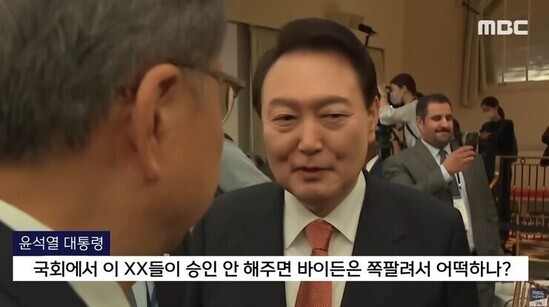hankyoreh
Links to other country sites 다른 나라 사이트 링크
[Column] Did reporting on Yoon’s hot mic gaffe really hurt Korea’s national interest?


By Kwon Tae-ho, editorial writer and head of journalism accountability
Then-President Lee Myung-bak’s visits to the US and Japan in April 2008 are remembered as a nightmare for the Blue House press corps at the time. While they did struggle with the tight schedule of Lee’s first overseas tour, the vast reporting volumes, and jet lag, the real reason for their stress had to do with the repeated embargo requests.
During a US Chamber of Commerce dinner, Lee announced the conclusion of a free trade agreement, saying that an “agreement was reached early this morning on the beef import issue that had been a stumbling block before.” He was offering a preview of what the two sides’ ministers would be announcing in 12 hours’ time.
Blue House spokesperson Lee Dong-kwan came to the briefing room and requested an embargo until the official announcement was made, citing issues of the “national interest” and “international trust.” While an argument was ensuing over whether the foreign press representatives there would also be subject to the embargo, the first reports were already coming out courtesy of Japan’s Kyodo News.
On the last day of Lee Myung-bak’s visit to Japan, the matter of US beef imports was broached at a breakfast meeting with reporters. “People are eating inexpensive, high-quality meat. If you don’t like it, buy less,” the president declared.
Later on, Lee Dong-kwan again requested that we keep the remarks off the record, citing the “national interest” and explaining that it had been an “informal dialogue.” Some coarse words were exchanged between Lee and certain reporters.
If these requests to keep presidential remarks off the record didn’t go over well 14 years ago, what is the likelihood of that happening in the year 2022?
After current President Yoon Suk-yeol’s recent hot mic gaffe, the spokesperson’s office initially made an “earnest request” to the press corps, which may have been meant as an embargo or an attempt to keep the remark off the record. But the media environment today is such that members of the press corps couldn’t accept that request even if they wanted to.
Nobody could have predicted what came 13 hours later, however: Yoon’s gaffe was turned into “twisted words,” while the captions on the video became “fake news.”
Presidential Chief of Staff Kim Dae-ki — who in his first public appearance 70 days into the administration asked reporters, “Do you know who I am?” — arrived personally in the briefing room, where he used the term “fake news” no fewer than six times. There had been no reference to “Biden,” he insisted, claiming not even to have heard the profanities.
He also put in an appearance at a high-level party/government meeting, where he effectively dictated talking points for the People Power Party (PPP): this was a case of “damaging the alliance with fake news.”
These kinds of hot mic incidents are a frequent occurrence in politics and diplomacy. US President Joe Biden and Canadian Prime Minister Justin Trudeau have each been caught using the terms “son of a bitch” and “piece of shit” to respectively refer to a reporter and an opposition party member. Both immediately apologized, and everybody moved on.
Philippine President Rodrigo Duterte also apologized right away after reports of a comment he had directed at then-US President Barack Obama in September 2016 over a policy of executing drug-related criminals. At the time, Duterte called Obama “son of a whore” for criticizing him.
In none of these cases did news outlets refrain from reporting for fear of “harming the national interest.” There were no ruling party lawmakers paying protest visits to new outlets and demanding that their president step down. In every case, the leader who misspoke subsequently apologized. Perhaps the days of heads of state saying they “can’t recall” what they just said are gone forever.
Once upon a time, they did just that. In 1971, then-Canadian Prime Minister Pierre Trudeau was caught on television mouthing the words “fuck off” during the opposition’s questioning of the administration in Parliament.
He subsequently insisted that he had not said “fuck off.” In his “explanation,” he bafflingly asked, “What is the nature of your thoughts, gentlemen, when you say ‘fuddle duddle’ or something like that?”
After becoming prime minister himself in 2015, his son Justin basically acknowledged his father’s swearing. He had not said “fuddle duddle.” How will future generations 44 years from now remember the profanities Yoon claimed not to remember using?
Past South Korean administrations have routinely talked about the “national interest” in cases of potentially damaging reporting. When it comes to the press choosing between “truth” and the “national interest,” that debate ended a long time ago.
In June 1971, the New York Times published the Pentagon Papers, which included details about the Gulf of Tonkin incident in 1964, which was manufactured by the US as a pretext for involvement in the Vietnam War. The Richard Nixon administration filed suit, charging that national secrets had been leaked, but the Supreme Court sided with the New York Times.
“The press [is] to serve the governed, not the governors,” it concluded.
The movie “The Post” (2017) provides an excellent look at the case. Even though it was a New York Times exclusive, the Washington Post also reported on it, even amid fears that it could jeopardize the newspaper’s future.
Speaking to a PPP lawmaker who has singled out MBC among the 140 or so news outlets that reported on the same matter, SBS anchor Ju Yeong-jin insisted that his network “did not [simply] follow MBC,” but “broadcast the story based on our own confirmation.”
The question that is being asked about the MBC report is whether cases of unclear words require confirmation with the one who uttered them. It’s impossible for reporters to confirm with a president about every utterance they make. That’s the job of the press secretary.
In cases of noisy dinners and other settings where words can’t be heard clearly, presidential office staffers and reporters listen once again and try to come to a consensus. In this case, 13 hours went by without a rebuttal.
In principle, it may be correct to stress the importance of “confirmation” for reports like this one. But it’s also craven.
Please direct questions or comments to [english@hani.co.kr]

Editorial・opinion
![[Column] Life on our Trisolaris [Column] Life on our Trisolaris](https://flexible.img.hani.co.kr/flexible/normal/500/300/imgdb/original/2024/0505/4817148682278544.jpg) [Column] Life on our Trisolaris
[Column] Life on our Trisolaris![[Editorial] Penalties for airing allegations against Korea’s first lady endanger free press [Editorial] Penalties for airing allegations against Korea’s first lady endanger free press](https://flexible.img.hani.co.kr/flexible/normal/500/300/imgdb/original/2024/0502/1817146398095106.jpg) [Editorial] Penalties for airing allegations against Korea’s first lady endanger free press
[Editorial] Penalties for airing allegations against Korea’s first lady endanger free press- [Editorial] Yoon must halt procurement of SM-3 interceptor missiles
- [Guest essay] Maybe Korea’s rapid population decline is an opportunity, not a crisis
- [Column] Can Yoon steer diplomacy with Russia, China back on track?
- [Column] Season 2 of special prosecutor probe may be coming to Korea soon
- [Column] Park Geun-hye déjà vu in Yoon Suk-yeol
- [Editorial] New weight of N. Korea’s nuclear threats makes dialogue all the more urgent
- [Guest essay] The real reason Korea’s new right wants to dub Rhee a founding father
- [Column] ‘Choson’: Is it time we start referring to N. Korea in its own terms?
Most viewed articles
- 1New sex-ed guidelines forbid teaching about homosexuality
- 2OECD upgrades Korea’s growth forecast from 2.2% to 2.6%
- 360% of young Koreans see no need to have kids after marriage
- 4[Column] Life on our Trisolaris
- 5Months and months of overdue wages are pushing migrant workers in Korea into debt
- 6Korean government’s compromise plan for medical reform swiftly rejected by doctors
- 7[Guest essay] Maybe Korea’s rapid population decline is an opportunity, not a crisis
- 8S. Korea discusses participation in defense development with AUKUS alliance
- 9Presidential office warns of veto in response to opposition passing special counsel probe act
- 10Inside the law for a special counsel probe over a Korean Marine’s death